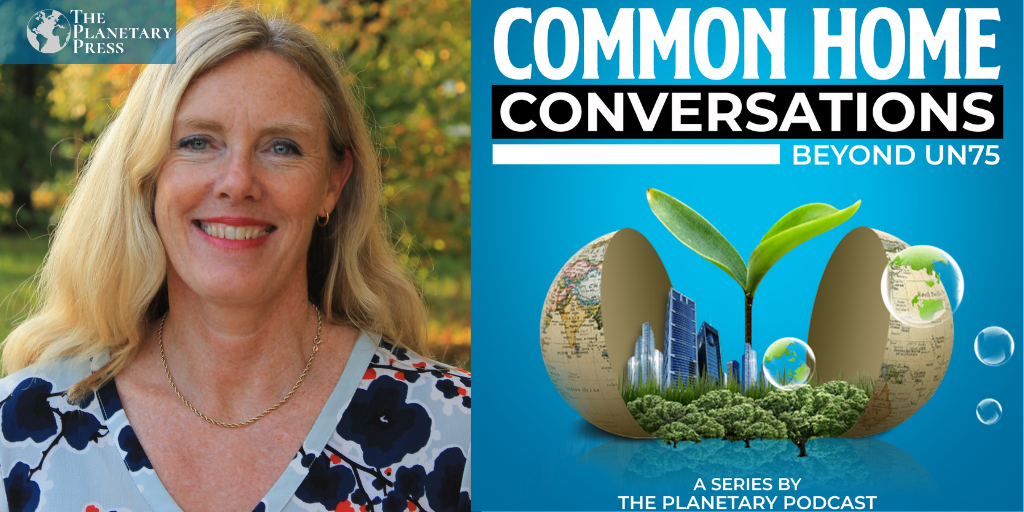Interview Transcript
Transcribed by Otter AI
Kimberly White
Hello and welcome to Common Home Conversations. Today we are joined by Prue Taylor, Deputy Director of the New Zealand Centre for Environmental Law. Prue is also a member of the IUCN Commission of Environmental Law and its Ethics Specialist Group. She was awarded the outstanding achievement award from the IUCN in recognition of her contribution as a world pioneer on law, ethics, and climate change. Thank you for joining us today!
Prue Taylor
You’re very welcome, Kimberly.
Kimberly White
So climate change doesn’t recognize borders; it spans our globe reaching the most remote corners, affecting all of us. It’s happening now, and it’s happening everywhere. And it’s happening at an alarming rate. Can you tell us about some of the adverse effects of climate change you’re seeing in New Zealand?
Prue Taylor
Absolutely, I can, because they’re happening on a daily basis. And they’re happening here in New Zealand in ways that are increasingly dramatic. And there is a growing acceptance that the impacts of climate change that we’re seeing here in New Zealand are, in fact, associated with, you know, changes to global atmospheric temperatures. So what we’re seeing in New Zealand, temperature increases, which are manifesting in more extreme drought events. So these drought events are longer than more severe, and they’re more frequent. And that’s really impacting us as a nation because we’re essentially still an agricultural nation. But also, our large urban areas are really starting to suffer. And Auckland City, which is our biggest urban area in New Zealand, is, as we speak, in the middle of a really serious water crisis. So there are a lot of water restrictions for us and the city right now. On the flip side of the coin, we’re seeing a lot of extreme rainfall events; when the rain comes, it really comes. And that is exacerbating the flooding risk for New Zealand. New Zealand, as a country that is very, very prone to floods anyway, it’s one of the significant natural hazards that we have. And climate change is accelerating and exacerbating those flooding events and risks. We’re also seeing more frequent storms and much more storm damage. We’re a long, narrow country in the middle of the massive Pacific Ocean. So we’re seeing a lot of coastal damage. In terms of the ocean, which is very close to my heart, we’re seeing increasing numbers of ocean heatwaves. So that is really where areas of the ocean are warming up very, very significantly around New Zealand. So we see some parts of the ocean around New Zealand with very elevated ocean temperatures between around four to five degrees Celsius higher than they would normally be. And that’s really, really a dramatic climate change impact. But probably the climate change impact that has really galvanized New Zealanders recently has been wildfires. Now wildfires is not something that New Zealand has really experienced very much in the past, unlike, of course, Australia. But very recently, we’ve had a number of wildfires impacting urban areas, not just our forestry sector, but also our urban areas. And that’s really started to focus the attention of New Zealanders on climate change impacts. And all of this has to be seen in a context which is quite unique to New Zealand. And that is that we’re in the middle of the massive Pacific Ocean, which means that to some degree, ocean function does protect us from some of the most dramatic impacts of climate change. In other words, the Pacific Ocean has been seen traditionally as a moderating element that would kind of insulate us somewhat from the impacts of increased global atmospheric temperature change. So it seems as though we’re not as insulated and protected by the Pacific Ocean as we had thought we might be.
Kimberly White
That’s interesting. We’ve seen wildfires in California, and you know, we see some significant flooding in Florida from climate change. One of the most interesting videos I think we’ve seen is from Miami. During the king tide a few years ago, there was a lot of flooding, and they filmed an octopus in a parking garage.
Prue Taylor
Yeah, yeah. Sometimes when you see those, you get those images of something dramatically out of place. They shock your consciousness, don’t they?
Kimberly White
Definitely. I think that was a wake-up call for a lot of people down in Miami for sure. As a professor and expert in international environmental law, do you think we need a new legal innovation to address the global climate and biodiversity crises?
Prue Taylor
Yes, I mean, if we open our eyes, and we look at the situation that we’re currently in with, you know, massive decline and our ecological systems and, you know, the sorts of climate change impacts that I’ve just talked about. When we look at where we’re at and what we’re experiencing, what natural systems, what’s happening to natural systems; How could we not acknowledge that we need some fundamental, fundamental change to our law and governance systems? I mean, to deny that we need change is to deny reality. And answering this question of governance absolutely, we need fundamental change. And, you know, I’ve been working in this area for 30 years, and I can honestly say, I feel that we are going backward. Okay, we’ve made some incremental improvements in some areas. And, you know, we have those incremental improvements in some areas. If we focus on those, we could say, well, we’ve achieved something. Something better than if we had had no international law and governance in this area. But frankly, when you look at it at an, you know, a level of accumulated impacts, and pace and scale, when really all we’ve been doing in the last 30 years, is an accelerated version of a really 1970s pollution control kind of approach, where we just look at continuing business as usual, but finding ways to mitigate or reduce harm, and I call this the do less harm approach. But what happens is, over time and scale, that less harm accumulates and accelerates and in combination with other harms and degradation to connected ecological systems. Everything is driving downwards. Everything is spiraling downwards. And the other fundamental or another fundamental failure of our existing law and governance framework, which really calls out for change, is the barrier that’s inherent in the system. Where nation-states grudgingly negotiate what they’re prepared to do or what they’re not prepared to do through or from the perspective of national self-interest. There is no sense of collective responsibility for the benefit of everyone that needs to qualify how we exercise national self-interest. So this kind of grudging, incremental, piecemeal negotiation of ecological crises, as they suddenly become apparent in isolation from other ecological crises, is imperiling our existence and imperiling the earth system, so we have to change.
Kimberly White
Absolutely. And with the pandemic, we see how interconnected everything is. These aren’t standalone issues.
Prue Taylor
Yep, absolutely right. They’re not standalone issues. But I think they, you know; COVID really demonstrates the magnitude of what’s going on and the pace of what’s happening. And therefore the scope of change that’s required.
Kimberly White
So how can the knowledge developed by Earth System Sciences and the definition of the earth system core drivers, the planetary boundaries, influence the concept of global commons?
Prue Taylor
I think that Earth System Science enables us to see what we intuitively knew existed before but couldn’t really adequately define and comprehend. So Earth System Science has given us a firm scientific basis to help us understand, comprehend, and define that we as humanity share a global ecological commons. So Earth System Science is crucial to that idea of a shared global ecological commons. But that global ecological commons is very complex. And it’s an interconnected system that we can now see operates at multiple scales, but ultimately, it operates at a planetary scale. And what Earth System Science helps us understand is at a very, very fundamental level, that what we do everywhere, and anywhere, impacts that shared global commons. So Earth System Science they’re taking this to sort of another level. Earth System Science helps us understand that we have a shared global ecological commons that supports and is the basis for all life.
So it’s a commons that we are part of as human beings, and we share with all life. However, Earth System Science also helps us comprehend and define and increasingly measure that this shared global commons is under very serious threat from the collective actions of humanity. Not from some evil god or some other source, but from the collective action of humanity. At another level, again, for me, what Earth System Science helps us to comprehend is, the earth system is a very fundamental part of our home. And this is our home, of course, that we share with all humanity and all life that we’re having detrimental impacts on. But Earth System Science helps us understand our home as something of incredible beauty. That, in fact, Earth System Science is part of the miracle of life on planet Earth. And this is a very, very precious thing that we share, it is a precious inheritance if you like, and we have to respect this and have a responsible attitude towards this precious inheritance. So ultimately, Earth System Science helps us understand that what we do to the earth system we do to ourselves. And if we treasure it, and nurture it and work towards its benefit, then we are, in fact, acting consistently with and responsibly towards the Earth. For the benefit of all.
Kimberly White
How can our oceans, already recognized as a global common, become a model when thinking about international law and governance?
Prue Taylor
Well, first of all, in answering that question, we have to begin by acknowledging, unfortunately, that current law and governance regimes for the oceans are deeply flawed. These law and governance regimes for the oceans, they share many of the problems of international environmental law. So I’d like to begin by saying, well, current law and governance for the ocean is deeply flawed. We can really better understand the potential of understanding the ocean as a global commons; if we step away from that traditional law and governance regime and think very deeply about how the ocean works as one interconnected ecosystem, one interconnected global ecosystem. So when we think of the ocean, it has a very fluid nature, and it connects all nations, and it connects all humanity. And ultimately, it operates as one system. And when we really get our heads around that incredible interconnectedness, then that really stands in stark contrast. And it defies the efforts of nation-states to continue to claim that their territorial rights and their sovereign rights can be exercised in a way that denies that reality. And other words can be exercised, irrespective of the interconnectedness of the ocean. So I think what’s really interesting about the ocean is that when we sit down and think about it, it’s an incredible model, at a different scale for the way the earth system works as an interconnected global commons. And although for many of us, it’s because human beings are often very focused on land, and biodiversity on land. For many of us, that territorial focus that we have, that land focus that we have, as human beings, takes us a while to really understand the magnitude of the oceans as a massive system. But once we do, I think that becomes a very good model that we can then get our heads around and use to help us to understand sort of the next level up the planetary scale of the earth system. I think also when we focus on the ocean, we can see it as a living system that can exhibit signs of good health, that’s well functioning systems. But equally, we’re starting to see that the ocean as an interconnected system can exhibit the signs of poor or bad health or degradation. And even in places, we can see parts of the ocean ecosystems dying. So I think sometimes, when we talk about Earth System Science, it can seem to be at a scale that is very difficult to comprehend. And to help us with that, we can begin by understanding how the ocean operates as a massive global ecological system that connects us all and then use that to help scale up our understanding and our thinking.
And there’s one other way in which the ocean is really important here. And that is that the ocean is an incredibly important element and the way the whole earth system operates. So it is one of those sorts of mega elements within the world, system if you like. So I think that’s also a way in which an understanding of the ocean as a global commons that’s interconnected, connects us, and whatever we do, wherever we are in relation to the ocean, impacts the whole. I think that that framework for understanding helps us get our head around the earth system and what’s happening with the earth system in a manageable way.
Kimberly White
And I think, you know, when you’re talking about those impacts of that shared responsibility, it reminds me of the plastic pollution crisis, almost. Because we all have these plastic bottles, and you throw them in the bin, and they go away, but they never really go away. They may be out of your sight, but they exist somewhere, continuing to cause problems for someone else.
All life on Earth shares global ecological commons, and we can now clearly define the interconnectedness of the earth system. It is time to take the next step in terms of law and governance to confront the global climate and biodiversity crisis. Do you think the common heritage concept for the earth system would better enable us to manage these crises that we and future generations face?
Prue Taylor
Yes, I do for a number of reasons. So, first of all, the common heritage is a very powerful existing legal concept. So it is a concept that we have international law and governance and have had for many decades. It was originally developed for exactly the sort of issues that we currently confront. So it was originally developed as a legal concept for a global ecological Commons. And that is for the ocean as one interconnected system. So that was its original scope if you like. And what the common heritage required was that states should act collectively, according to a management regime. And that management regime for the ocean required states to act in an ecologically responsible way, not for their own benefit as states but for the benefit of all humanity and for the benefit of all life. So what the common heritage regime did was recognize the oceans as a precious common inheritance that we all have responsibility for. And what this meant, then, was that the priority for human use of the ocean as an interconnected ecological system, no matter where that use occurred, the priority of that human use became one of managing our activities consistently with achieving ecological benefits for humanity and for all human life. So the focus of common heritage, as it was originally developed, was very much centered on a shared global ecological Commons that we have to manage collectively in a responsible way. To ensure that the ecological Commons flourishes and benefits and that the benefits are enjoyed and shared by all. Now, that doesn’t mean that states could not use ocean ecological systems. But the use of those systems, the priority of the use of those systems was to ensure the functioning, the ecological functioning of those ocean systems continued.
Kimberly White
Now, you’ve said that we need new global governance and law that brings humanity together to achieve ecological benefits. How can the Earth System approach to the Global Pact for the Environment be the conceptual evolution to give sense to these initiatives, goals, and holistic approaches?
Prue Taylor
We’ve talked already about how Earth System Science helps us understand that we share an interconnected global ecological Commons. And we’ve also talked about how Earth System Science helps us understand the massive detrimental impact that we’re currently having on that shared global commons. What Earth System Science also enables us to comprehend and really, really come to grips with is that we need to take a very transformative approach to law and governance. And by transformative, I mean, we really need to change so that we put the function of the earth system, at the very center of our law and governance framework. And we have to look at that centering and prioritizing of the earth system, in terms of, how do we now work to achieve benefits for the earth system? So this is so radical that we’re essentially flipping the objective of our law and governance framework on its head, to be really placing the functioning of the earth system at the core of what we’re trying to achieve, and so much at the core that we can’t just continue to approach it from a perspective of how can we do what we currently do while doing less harm, but rather, we need to now change that priority to being how do we manage ourselves and everything we do in a way that also returns a benefit to ecological systems and to the earth system. So in simple terms, what Earth System Science can help us better understand in terms of the transformative changes that we have to make, can come down to this we have to start asking ourselves, what can we do for the earth system? Not solely, what does the earth system do for us. And by taking this approach and applying it to the global pact, we can take law and governance beyond a 19th century, 20th-century approach where we consider the problems that we face through the very sort of incremental, narrow, piecemeal focus, essentially of pollution control and wanting to continue business as usual. So all of that could change if we really applied an earth system approach and saw its transformative potential to law and governance and as a new conceptual basis for the global pact. So another way of understanding this, I like to use the example of farming. A farming example can help understand this transformative change, I think. So a traditional model of a good farmer enabled a farmer to use the land for sustenance and use the land for benefit. But the traditional farmer also understood that their responsibility included ensuring that that use of the land occurred in a way that also built up the health of the soil for present generations and for future generations. So this idea of using resources but also returning a benefit, at the same time to the ecological systems that supported human use, were not mutually exclusive; they were part of a whole system. So use rights are a privilege. And there is a responsibility to ensure the continued health and well being of the whole so that those use rights could continue to deliver human health and well-being. These were not mutually exclusive things they’ve worked together and in unison. And as that sort of thinking and management of human activities everywhere, at every scale, that we need to return to and Earth System Science helps us to get there.
Kimberly White
Excellent points. And you’re absolutely right. It’s time to shift away from that business as usual mindset that got us in this mess in the first place. So it’s time to, you know, transform our systems and shift towards more sustainable options. Now, speaking of transformation, do you think that we can transform the law to overcome our territorial obsessions so that humanity can exercise at an international level connected responsibility for our impacts on the earth?
Prue Taylor
Yes, we can do this. Yes, we can absolutely do this. But we have to want to do this enough. And we have to want to do this before we are forced to do this. And my concern is, if we don’t develop this collective willingness to make these changes, very, very soon, then our opportunities to come together outside of a terrible emergency situation become greatly diminished. So we have a window of opportunity, but we have to recognize that as a window of opportunity and really want to do this. And if we want to do this enough, we can do this. There’s nothing, I can’t see anything that stands in our way apart from our willingness to do this, and our belief, and our understanding that this will benefit everybody if we do this well together. We can shape a law and governance regime that will be for the benefit of everyone. We can do that. We just have to want to do that badly enough. And we have to believe that human beings can act collectively together for the common good, that we are cooperative, collective thinkers, that we are capable of this. We have to believe in ourselves.
Kimberly White
And you know, I think, internationally right now, we do see some countries, New Zealand being one of them, really at the forefront of climate leadership. As I mentioned earlier, I’m in the U.S., and we’ve been dealing with a lot of climate inaction. So a lot of that has to do with this political will. And I think we as a civil society, academia, corporate world, etc., we all need to come together to make our voices heard and demand this change. Because at this point,, this is the moment, this is the time for action. We don’t have time to waste anymore.
Prue Taylor
Yeah, I also think it’s very important that we think about the problems that we have, and we communicate the problems that we have as fundamentally ethical issues and issues of justice, not just scientific issues or economic issues. I mean, that sort of framing, it really creates a barrier to people’s willingness to stand up and demand change, right?
Kimberly White
Definitely.
Prue Taylor
I think that’s where, you know, some of these youth movements are starting to shake things up, particularly in the climate change context. Because for so long, our ability to collaborate, to you know, really develop responses to climate change have been inhibited because we’ve been constantly approaching them from the perspective of; what is the science, what are the economic realities, blah, blah, blah, but omitting to really see these issues as very much issues of justice for present and future generations, no matter where those generations are.
Kimberly White
Absolutely, I think we see many of the youth come out, and I think that’s been overwhelmingly a positive thing. Because they’re forcing us to have those hard conversations that I think we’ve typically avoided. So we’re definitely in an interesting time, especially with COVID. We’re starting to see more talk with the recovery efforts, and hopefully, that talk leads to action. Because at this point, we’ve had a lot of talk, but we need a lot more action. A stable climate is a manifestation of a well-functioning earth system. Can we utilize the common heritage concept to the earth system as a whole? And can the evolution and redefinition of the concept of global commons be the base for a new global legal framework?
Prue Taylor
My answer to that is yes. But a fundamental key to utilizing the common heritage concept is to understand its scope and its intention, as it was originally developed. So we need to understand common heritage as it was originally developed, and as it was initially intended, and not allow ourselves to be distracted by some of the very narrow and limited legal interpretations that emerged around common heritage in the 1970s and the 1980s. So, in short, to unleash the really great potential of the common heritage concept. We need to not be distracted by some of the restricted uses that have been imposed upon it. But to go back to its original scope and its original intention, and to understand that it’s at its very essence, common heritage is about collective ecological responsibilities for the benefit of all and that those collective responsibilities, they apply no matter where human activities occur. And what the common heritage concept tells us or reminds us, there’s something very, very challenging for traditional international law. Common heritage tells us that territorial sovereignty can no longer be used as a justification to not fulfill those common responsibilities or as a justification for abdication of responsibility. So common heritage really does transform ideas around territorial sovereignty and sovereign rights and imposes upon our understanding of territorial sovereignty, this deep, collective responsibility to work for the benefit of all that does not mean that a state doesn’t have sovereignty over its territory; it qualifies the exercise of that territorial sovereignty in a way that ensures, first and foremost a collective benefit is the priority is the objective.
Kimberly White
What was it about the proposal from the Common Home of Humanity that stood out to you and made you decide to join this initiative?
Prue Taylor
What the Common Home of Humanity does is it brings together Earth System Science with law and governance, and it attempts to transform the existing system. So it doesn’t try and tweak or compromise our existing law and governance system. It brings these things together in a way that will potentially lead to a transformative change in terms of what are our central priorities, what are our collective responsibilities? How do we get beyond business as usual and focus on returning a benefit to a deeply interconnected but deeply degraded earth system? So it has that potential to really lead very significant transformative change. And that makes it very exciting. And it means to me that we are finally getting to a point where science is coming together with law and governance. And it’s coming together in a way that goes beyond enhanced business as usual techniques to changes that are truly, truly transformative because they have put the functioning of the earth system at the very center of everything. We do everything we think about the very, very center of human existence.
When I started researching and writing about international environmental law 30 years ago, I started with a focus on climate change. That was my issue if you like, and at that time, we really didn’t have a good understanding of the earth operating as one interconnected system. Right. We tried to use words like a global environment, or a global commons, or Gaia. But you know, we were always kind of struggling with a conceptual framework and a scientific framework around which we could demonstrate that what people and nation states do and don’t do within their legal territories has a dramatic impact on the whole and therefore is our responsibility and concern of the whole humanity. So, Earth System Science is sort of a bit of when we really understand it as sort of a eureka moment, because it says, well, actually, this does exist. And it does operate in this way. And it is capable of being decimated and degraded, but equally, it is capable of recovery. And, you know, perhaps we have focused a little bit too much on the on, you know, the extent to which we have harmed the earth system. But in talking about returning a benefit, I think, you know, that’s not just a nice idea. The fact is that, if we do start returning benefits to these systems, they are capable of recovery; they really are capable of recovery. And so the key message is that by working towards the benefit of a well-functioning earth system, we’re not giving up things, losing things; we’re actually working towards positive outcomes for everybody. So I think it’s a science that helps us focus on the potential of the positive. Right. And that’s very powerful. The way we frame our responses to issues like climate change at the moment is always focused on the negative or the incremental and the negative, not the positive, transformative.
Kimberly White
All right, and there you have it. When we look at the situation that we’re currently in with the climate crisis and the massive decline in biodiversity and ecological systems, it’s clear that we need fundamental change to our law and governance systems. To deny that we need change is to deny reality. And by taking the Earth System approach and applying it to the global pact, we can bring about the transformative changes we need to law and governance for the common good. We can do this. That is all for today, and thank you for joining us for this episode of Common Home Conversations Beyond UN75. Please subscribe, share, and be sure to tune in next week to continue the conversation with our special guest, Richard Ponzio, Director of the Just Security 2020 Program at the Stimson Center. And visit us at www.ThePlanetaryPress.com for more episodes and the latest news in sustainability, climate change, and the environment.
For more episodes, visit Common Home Conversations Beyond UN75







